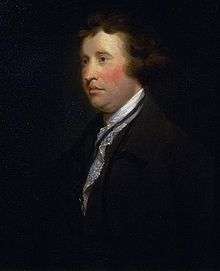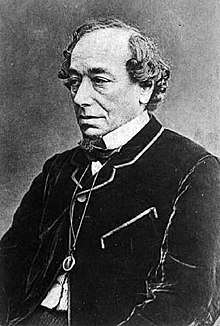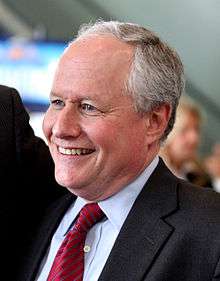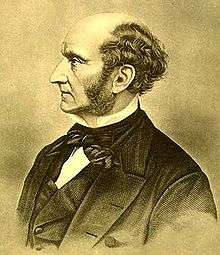
Conservatism is a political and social philosophy promoting traditional social institutions in the context of culture and civilization. The central tenets of conservatism include tradition, human imperfection, organic society, hierarchy and authority and property rights. Conservatives seek to preserve a range of institutions such as monarchy, religion, parliamentary government and property rights with the aim of emphasizing social stability and continuity while the more extreme elements called reactionaries oppose modernism and seek a return to a status quo ante.
Quotes
- Sorted alphabetically by author or source





- CONSERVATIVE, n. A statesman who is enamored of existing evils, as distinguished from the Liberal, who wishes to replace them with others.
- Ambrose Bierce, The Cynic's Dictionary (1906); republished as The Devil's Dictionary (1911)
- [T]he reason why I'm a conservative today is because poverty is what I care about the most and conservative ideas have done more.
- If conservatism is ever to recover it has to achieve two large tasks. First, it has to find a moral purpose large enough to displace the lure of blood-and-soil nationalism. Second, it has to restore standards of professional competence and reassert the importance of experience, integrity and political craftsmanship. When you take away excellence and integrity, loyalty to the great leader is the only currency that remains.
- David Brooks, "The Rise of the Resentniks: And the populist war on excellence" (15 November 2018), The New York Times
- A conservative need not be religious, but a conservative cannot despise religion.
- William F. Buckley, as quoted in "a+CONSE Upstream: The Ascendance of American Conservatism (2008), by Alfred S. Regnery, p. 335
- [C]onservatism is not supposed to be against change or progress... It is supposed to be skeptical of grandiose or reckless schemes which throw out the good in pursuit of the perfect.
- "Who the Hell Do You Think You Are?" (10 May 2000), National Review
- A state without the means of some change is without the means of its conservation.
- It is to the property of the citizen, and not to the demands of the creditor of the state, that the first and original faith of civil society is pledged. The claim of the citizen is prior in time, paramount in title, superior in equity. The fortunes of individuals, whether possessed by acquisition or by descent or in virtue of a participation in the goods of some community, were no part of the creditor's security, expressed or implied... the public, whether represented by a monarch or by a senate, can pledge nothing but the public estate; and it can have no public estate except in what it derives from a just and proportioned imposition upon the citizens at large.
- Edmund Burke on fiscal conservatism, Reflections on the Revolution in France [1790] (London: Penguin Classics, 1986), pp. 207-8
- They are the driven crowds that makes the army of the authoritarian overlord; they are the stuffing of conservatism ... mediocrity is their god. They fear the stranger, they fear the new idea; they are afraid to live, and scared to die.
- Donald Ewen Cameron as quoted by Harvey Weinstein in Father, Son and CIA pg. 101
- A Radical generally meant a man who thought he could somehow pull up the root without affecting the flower. A Conservative generally meant a man who wanted to conserve everything except his own reason for conserving anything.
- G.K. Chesterton, in "The Evolution of Words and Meanings" in The Illustrated London News (3 July 1920)
- I am a Conservative to preserve all that is good in our constitution, a Radical to remove all that is bad. I seek to preserve property and to respect order, and I equally decry the appeal to the passions of the many or the prejudices of the few.
- Benjamin Disraeli, in a speech at High Wycombe, England (27 November 1832); published in Selected Speeches of the Late Right Honourable the Earl of Beaconsfield, ed. T. E. Kebbel (1882), volume 1, p. 8.
- Why do right-wing women agitate for their own subordination? How does the Right, controlled by men, enlist their participation and loyalty? And why do right-wing women truly hate the feminist struggle for equality?
- Andrea Dworkin, Letters from a War Zone, p. 194
- You know what a Tory is — one who wants to drive the working men as he'd drive cattle.
- George Eliot, Felix Holt, The Radical, (1866), Ch. 11, p. 121
- Is not every man sometimes a radical in politics? Men are conservatives when they are least vigorous, or when they are most luxurious. They are conservatives after dinner, or before taking their rest; when they are sick, or aged. In the morning, or when their intellect or their conscience has been aroused; when they hear music, or when they read poetry, they are radicals.
- Ralph Waldo Emerson, "New England Reformers", lecture read before the Church of the Disciples, Amory Hall, Boston, Massachusetts (March 3, 1844); published in Essays: Second Series (vol. 3 of The Complete Works of Ralph Waldo Emerson; 1903), p. 272
- From Disraeli to Oakeshott, conservatism has been defined for its distrust of ideology, and a preference for pragmatism, compromise and what has gone before. David Cameron has said he is Conservative because he recognises "the complexities of human nature, and will always be sceptical of grand schemes to remake the world". Admittedly some Republicans are just as hell-bent on ideology as some lefties, but the conservative philosophy is of scepticism, not visions.
- L.S.S., "Keynes and Hayek: Adventures in Wonderland", in The Economist: Free Exchange (31 August 2012)
- The modern conservative is engaged in one of man's oldest exercises in moral philosophy; that is, the search for a superior moral justification for selfishness.
- John Kenneth Galbraith, "Stop the Madness," interview with Rupert Cornwell, Toronto Globe and Mail (6 July 2002)
- The perils of change are so great, the promise of the most hopeful theories is so often deceptive, that it is frequently the wiser part to uphold the existing state of things, if it can be done, even though, in point of argument, it should be utterly indefensible.
- Robert Gascoyne-Cecil (Lord Salisbury), c. 1890, as quoted in A Question of Leadership (1991) by Peter Clarke
- [P]rogressives seem to think that conservatives distrust the government because of some esoteric philosophical theory, or because we had some weird dream involving Ayn Rand. In reality, it’s because we’ve been told to trust the government before — and we’ve gotten burned, time and time again.
- Jim Geraghty, "Ten Reasons We Can’t, and Shouldn’t, Be Nordic" (12 March 2018), National Review
- Why is it fair game to question conservatives' love or loyalty to children or to their fellow man, but beyond the pale to question liberals' love of country?
- Jonah Goldberg, "Patriot Games" (21 April 2004), National Review
- The way you sustain and improve upon a culture is by fostering a sense of gratitude for what is best about it. You celebrate the good in your story while putting the bad in the correct context. Conservatism is gratitude...
- Jonah Goldberg, "What’s So Great about Western Civilization" (19 April 2019), National Review
- There's a tremendous irony in the way conservatives have adopted their position on evolution. After all, the right has been complaining about relativism — the idea that there is no absolute truth — for years. Now, challenging the conclusions of science in the name of cultural tolerance, conservatives have created their own version of radical deconstructionism. Aping the French academicians they once excoriated, they're undermining the very idea of empirical reality, dismissing inconvenient facts as the product of an oppressive ideology.
- Michelle Goldberg in Kingdom Coming: The Rise of Christian Nationalism (2006) edited by W. W. Norton, p. 102
- Conservatism, though a necessary element in any stable society, is not a social program; in its paternalistic, nationalistic and power adoring tendencies it is often closer to socialism than true liberalism; and with its traditionalistic, anti-intellectual, and often mystical propensities it will never, except in short periods of disillusionment, appeal to the young and all those others who believe that some changes are desirable if this world is to become a better place.
- Friedrich Hayek, The Road to Serfdom (1944), p. xi
- Conservatism proper is a legitimate, probably necessary, and certainly widespread attitude of opposition to drastic change.
- F.A. Hayek, "Why I Am Not a Conservative" (1960), The Constitution of Liberty
- Let me now state what seems to me the decisive objection to any conservatism which deserves to be called such. It is that by its very nature it cannot offer an alternative to the direction in which we are moving. It may succeed by its resistance to current tendencies in slowing down undesirable developments, but, since it does not indicate another direction, it cannot prevent their continuance. It has, for this reason, invariably been the fate of conservatism to be dragged along a path not of its own choosing. The tug of war between conservatives and progressives can only affect the speed, not the direction, of contemporary developments.
- F.A. Hayek, "Why I Am Not a Conservative"] (1960), The Constitution of Liberty
- Conservatives do not believe that political struggle is the most important thing in life... The simplest among them prefer fox-hunting — the wisest religion.
- Quintin Hogg, The Case for Conservatism (1947), p. 10
- A conservative is someone who does not think he is morally superior to his grandfather.
- John Howard quote from The Howard Era
- I do not know which makes a man more conservative — to know nothing but the present, or nothing but the past.
- It is not an accident that the Conservative Government have landed us in the mess where we find ourselves. It is the natural outcome of their philosophy:
"You must not press on with telephones or electricity, because this will raise the rate of interest."
"You must not hasten with roads or housing, because this will use up opportunities for employment which we may need in later years."
"You must not try to employ every one, because this will cause inflation."
"You must not invest, because how can you know that it will pay?"
"You must not do anything, because this will only mean that you can't do something else."
"Safety First! The policy of maintaining a million unemployed has now been pursued for eight years without disaster. Why risk a change?"
"We will not promise more than we can perform. We, therefore, promise nothing."This is what we are being fed with.
They are slogans of depression and decay—the timidities and obstructions and stupidities of a sinking administrative vitality.- John Maynard Keynes, "A Programme of Expansion" (General Election, May 1929), published in Essays in Persuasion (1931)
- Isn’t conservatism in part about resisting so-called new realities when you sense they might be questionable, even as people lecture you that you’ve got to get with the times?
- Bill Kristol, "Still a Republican" (23 March 2018), The Weekly Standard
- [Conservatism:] Our revolutionary message … is that a self-disciplined people can create a political community in which an ordered liberty will promote both economic prosperity and political participation.
- Irving Kristol, essay in American Spectator Magazine (1977)
- Lord Etheringhame’s opinions were as hereditary as his halls; innovation was moral rebellion; the change of a fashion, a symptom of degeneracy; he would as soon have destroyed his pedigree as his pigtail; and looked on every new patent, whether for a peerage or a pie-dish, as another step to ruin; in short, he held just the reverse of the poet’s opinion — with him, not whatever is, but whatever had been, was right.
- Letitia Elizabeth Landon, Romance and Reality (1831), Vol. I, Ch. 4
- You say you are conservative — eminently conservative — while we are revolutionary, destructive, or something of the sort. What is conservatism? Is it not adherence to the old and tried, against the new and untried? We stick to, contend for, the identical old policy on the point in controversy which was adopted by "our fathers who framed the Government under which we live;" while you with one accord reject, and scout, and spit upon that old policy, and insist upon substituting something new. True, you disagree among yourselves as to what that substitute shall be. You are divided on new propositions and plans, but you are unanimous in rejecting and denouncing the old policy of the fathers.
- Conservatism is about protecting the fundamental rights: That we are all equal, regardless of the color of our skin, the faith that we practice or our gender.
- Evan McMullin, as quoted in "Evan McMullin: Conservatives must now abandon the Republican Party" (9 November 2016), by Josh Rogin, The Washington Post
- I never meant to say that the conservatives are generally stupid. I meant to say that stupid people are generally Conservative. I believe that is so obviously and universally admitted a principle that I hardly think any gentleman will deny it.
- John Stuart Mill, in a letter to the Conservative MP, John Pakington (March 1866); this seems to have become paraphrased as "Conservatives are not necessarily stupid, but most stupid people are conservatives." which was a variant published in Quotations for Our Time (1978), edited by Laurence J. Peter
- The differentiation of conservatism rests on the estimate of necessity in any given case. Thus conservatism is purely an ad hoc affair; its findings vary with conditions, and are good for this day and train only. Conservatism is not a body of opinion, it has no set platform or creed, and hence, strictly speaking, there is no such thing as a hundred-per-cent conservative group or party … Nor is conservatism an attitude of sentiment. Dickens's fine old unintelligent characters who "kept up the barrier, sir, against modern innovations" were not conservatives. They were sentimental obstructionists, probably also obscurantists, but not conservatives.
Nor yet is conservatism the antithesis of radicalism; the antithesis of radical is superficial. Falkland was a great radical; he was never for a moment caught by the superficial aspect of things. A person may be as radical as you please, and still may make an extremely conservative estimate of the force of necessity exhibited by a given set of conditions. A radical, for example, may think we should get on a great deal better if we had an entirely different system of government, and yet, at this time and under conditions now existing, he may take a strongly conservative view of the necessity for pitching out our system, neck and crop, and replacing it with another. He may think our fiscal system is iniquitous in theory and monstrous in practice, and be ever so sure he could propose a better one, but if on consideration of all the circumstances he finds that it is not necessary to change that system, he is capable of maintaining stoutly that it is necessary not to change it. The conservative is a person who considers very closely every chance, even the longest, of "throwing out the baby with the bath-water," as the German proverb puts it, and who determines his conduct accordingly.- Albert Jay Nock, in 'A Little Conserva-tive' in The Atlantic Monthly (October 1936)
- To be conservative, then, is to prefer the familiar to the unknown, to prefer the tried to the untried, fact to mystery, the actual to the possible, the limited to the unbounded, the near to the distant, the sufficient to the superabundant, the convenient to the perfect, present laughter to utopian bliss. Familiar relationships and loyalties will be preferred to the allure of more profitable attachments; to acquire and to enlarge will be less important than to keep, to cultivate and to enjoy; the grief of loss will be more acute than the excitement of novelty or promise. It is to be equal to one's own fortune, to live at the level of one's own means, to be content with the want of greater perfection which belongs alike to oneself and one's circumstances.
- Michael Oakeshott, On Being Conservative (1962)
- Conservative ideology...may be defined as a philosophy of imperfection, committed to...the defence of a limited style of politics.
- Noël O'Sullivan, Conservatism (New York: St. Martin's Press, 1976), pp. 11-12
- The real division is not between conservatives and revolutionaries but between authoritarians and libertarians.
- George Orwell, in a letter to Malcolm Muggeridge (4 December 1948), published in Malcolm Muggeridge : A Life (1980) by Ian Hunter
- What do we call conservative, and what do we call liberal, in daily life? A conservative explains behavior spiritually, and personalizes responsibility. In Aristotelian terms, the principle of motion is within us. A liberal, by contrast, explains behavior mechanically, and externalizes responsibility: the principle of motion is outside us. Thus, in the typical policy debate, a liberal makes excuses for the human agent, and a conservative places blame. The spark of the liberal argument — He didn’t have the same opportunities you did — meets the conservative conceptual firewall: Lots of people start poor, but still find ways to make it.
- Ever since 1953, when Russell Kirk produced its intellectual coat of arms, conservatism has been "what Edmund Burke wrote." This is the equivalent of Arthur Danto’s institutional theory of art — art is whatever the art world says it is. But it’s also a cop-out. Instead of analyzing conservatism in an Aristotelian way, instead of asking how we use the term in real life, we just describe Burke. In the process, don’t we risk fleeing into what Tanenhaus calls an "alternative universe"? If conservatives are "glaringly disconnected from the realities now besetting America," as Tanenhaus says, why is the solution to be more like a man who wore a powdered wig? Liberals have problems of their own, but, to their credit, they don’t sit around debating whether Hillary Clinton or John Edwards is the "real Rousseauian."
- If movement conservatism is less about hating the state than about fighting Godless modernism, this might explain why conservatives have always found actual or cultural wars to fight, but have never got around to shrinking or controlling the growth of government (though centrists like Eisenhower and Clinton did).
- Mark Riebling, "Conservatism Turned Upside Down: Sam Tanenhaus' Critique of Conservative Reason," City Journal (16 October 2009)
- Conservatism is a defense of established hierarchies, but it is also fearful of those established hierarchies. It sees in their assuredness of power the source of corruption, decadence and decline. Ruling regimes require some kind of irritant, a grain of sand in the oyster, to reactivate their latent powers, to exercise their atrophied muscles, to make their pearls.
- Corey Robin, in interview with Henry Farrell, "Trump is a typical conservative. That says a lot about the conservative tradition." (1 February 2018)
- Conservative: One who admires radicals a century after they're dead.
- Leo Rosten, as quoted in Ralph Louis Woods, The Modern Handbook of Humor (1967)
- Conservatism is itself a modernism, and in this lies the secret of its success.
- Roger Scruton, "Eliot and Conservatism", A Political Philosophy (2006), p. 194
- The conservative response to modernity is to embrace it, but to embrace it critically, in full consciousness that human achievements are rare and precarious, that we have no God-given right to destroy our inheritance, but must always patiently submit to the voice of order, and set an example of orderly living.
- Roger Scruton, "Eliot and Conservatism", A Political Philosophy (2006), p. 208
- The kind of Conservatism which he (Keith Joseph) and I...favoured would be best described as "liberal", in the old-fashioned sense. And I mean the liberalism of Mr. Gladstone not of the latter day collectivists.
- The conservative in financial circles I have often described as a man who thinks nothing new ought ever to be adopted for the first time.
- Frank Arthur Vanderlip, From Farm Boy to Financier (1935), Ch. 25, p. 257
- The office of the leisure class in social evolution is to retard the movement and to conserve what is obsolescent. This proposition is by no means novel; it has long been one of the commonplaces of popular opinion.
- Thorstein Veblen, The Theory of the Leisure Class (1899) Ch. 8, p. 198
- Conservatism, being an upper-class characteristic, is decorous; and conversely, innovation, being a lower-class phenomenon, is vulgar. ...Innovation is bad form.
- Thorstein Veblen, The Theory of the Leisure Class (1899) Ch. 8, p. 200
- The fact that the usages, actions, and views of the well-to-do leisure class acquire the character of a prescriptive canon of conduct for the rest of society, gives added weight and reach to the conservative influence of that class. It makes it incumbent upon all reputable people to follow their lead.
- Thorstein Veblen, The Theory of the Leisure Class (1899) Ch. 8, p. 200
- The institution of a leisure class acts to make the lower classes conservative by withdrawing from them as much as it may of the means of sustenance, and so reducing their consumption, and consequently their available energy, to such a point as to make them incapable of the effort required for the learning and adoption of new habits of thought.
- Thorstein Veblen, The Theory of the Leisure Class (1899) Ch. 8, p. 204
- The struggle between the opponents and defenders of capitalism is a struggle between innovators who do not know what innovation to make and conservatives who do not know what to conserve.
- Simone Weil, in "The Power of Words" (1937)
- Like Aristotle, conservatives generally accept the world as it is; they distrust the politics of abstract reason – that is, reason divorced from experience.
- It only takes 20 years for a liberal to become a conservative without changing a single idea.
- Robert Anton Wilson, in The Illuminati Papers (1980), p. 111